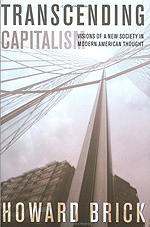
(Cornell University Press, 2006)
In his third book, Howard Brick attempts to answer the specifically historical question of how to understand the debate among American (and European) social theorists in the middle of the 20th century on how significantly the modern “welfare state” had altered the character of capitalist economies since the 19th century.
But the book started to take shape after two key developments of the 1990s.
“First, the fall of the Soviet Union and thus ‘the end of the Cold War,’ and second, the economic boom of the late 1990s,” Brick explains. “Taken together, these two developments promoted a kind of ‘capitalist triumphalism,’ the view that the contemporary world was decisively capitalist and would ever be so since this order of things had demonstrated its power, endurance and superiority to all alternatives, real or imagined.
“Such was not the view of mid-20th century social theorists, many of whom — mainstream writers who were far from radicals or socialists — believed modern society, including American society, tended to evolve in a direction pointing beyond capitalism to a postcapitalist society no longer based on the centrality of market economics. Many of them did not even think that contemporary industrial (or postindustrial) societies were accurately called ‘capitalist.'”
So, Brick explains historically how those social theorists thought the way they did, thinking that it might “help enliven contemporary understanding of social and economic life and its possible course of development in the future, by reminding us of times when the conventional wisdom was not quite so monochrome as it is now.”
Geared mainly toward historians and social scientists, Brick hopes the book will be relevant to other fields such as literary and cultural studies, which are concerned with the role of social theory in various kinds of analysis and interpretation.
“While it is devoted to the history of ideas, some of them fairly abstract and complex, I have written it with the intent of rendering the main currents of modern social theory in clear, understandable terms,” Brick says. “Therefore, while it is of interest to specialists, it should appeal to any educated reader interested in the history of 20th-century American social science and politics.”
According to Brick, the book offers a significantly new interpretation of American intellectual history for much of the 20th century — at least with regard to the broad field of social thought.
It is not intended as a celebration of American social theory in that period but rather as an attempt to set the record straight about one main current of liberal social science
While “Transcending Capitalism” deals mostly with sociology and the areas of economics, anthropology and social psychology closest to sociology, Brick’s next book will examine theories of world development fostered by innovative anthropologists, among others, after the 1940s.
Published in December, “Transcending Capitalism” received an Honorable Mention from the Organization of American Historians’ 2007 Merle Curti Award committee for the best book in intellectual history.
— Andy Clendennen